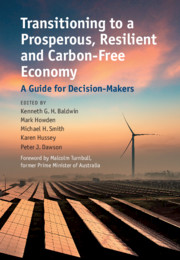Book contents
- Transitioning to a Prosperous, Resilient and Carbon-Free Economy
- Transitioning to a Prosperous, Resilient and Carbon-Free Economy
- Copyright page
- Dedication
- Contents
- Figures
- Tables
- Contributors
- Foreword
- Introduction
- 1 Policy Frameworks and Institutions for Decarbonisation: The Energy Sector as ‘Litmus Test’
- Technologies for Decarbonising the Electricity Sector
- 2 Wind Energy
- 3 Solar Photovoltaics
- 4 Solar Thermal Energy
- 5 Nuclear Energy
- 6 Hydropower
- 7 Energy Storage
- 8 The Hydrogen Economy
- Example Economies
- Cities and Industry
- Land Use, Forests and Agriculture
- Mining, Metals, Oil and Gas
- Addressing Barriers io Change
- Index
- References
8 - The Hydrogen Economy
from Technologies for Decarbonising the Electricity Sector
Published online by Cambridge University Press: 08 October 2021
- Transitioning to a Prosperous, Resilient and Carbon-Free Economy
- Transitioning to a Prosperous, Resilient and Carbon-Free Economy
- Copyright page
- Dedication
- Contents
- Figures
- Tables
- Contributors
- Foreword
- Introduction
- 1 Policy Frameworks and Institutions for Decarbonisation: The Energy Sector as ‘Litmus Test’
- Technologies for Decarbonising the Electricity Sector
- 2 Wind Energy
- 3 Solar Photovoltaics
- 4 Solar Thermal Energy
- 5 Nuclear Energy
- 6 Hydropower
- 7 Energy Storage
- 8 The Hydrogen Economy
- Example Economies
- Cities and Industry
- Land Use, Forests and Agriculture
- Mining, Metals, Oil and Gas
- Addressing Barriers io Change
- Index
- References
Summary
Hydrogen could help transition the global energy system to a low-carbon future by providing an energy-dense, carbon-free fuel suitable for a wide range of applications. Hydrogen is already used extensively by industry; however, the current supply chain is relatively simple and relies heavily on fossil fuels, resulting in greenhouse gas emissions. The value chain for a future hydrogen economy will be more complex and require different technologies to be further developed and scaled up, including low-emission hydrogen production, large-scale storage and transport, and new energy and industry applications. Hydrogen produced with zero carbon emissions has the potential to be a major new globally traded commodity, which could enable countries with limited renewable energy potential to decarbonise their economies, diversify the global energy supply, and increase energy security. The emergence of the hydrogen economy faces economic, social acceptance and regulatory challenges. Governments around the world have a role to play in providing policies to address potential market failures, socialising the widespread use of hydrogen and establishing international governance and regulations.
Keywords
- Type
- Chapter
- Information
- Transitioning to a Prosperous, Resilient and Carbon-Free EconomyA Guide for Decision-Makers, pp. 173 - 200Publisher: Cambridge University PressPrint publication year: 2021

